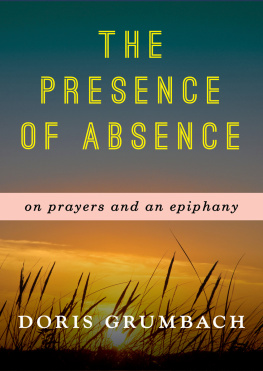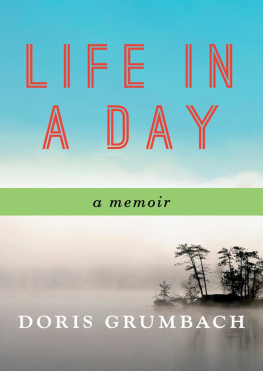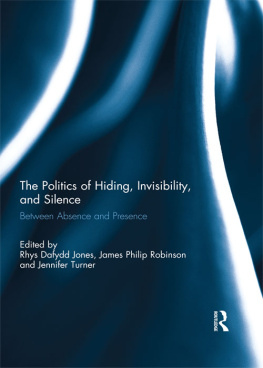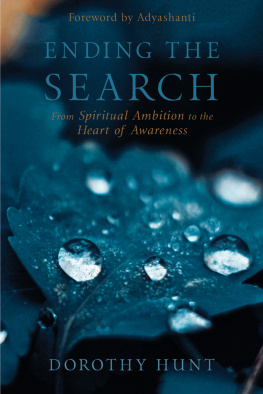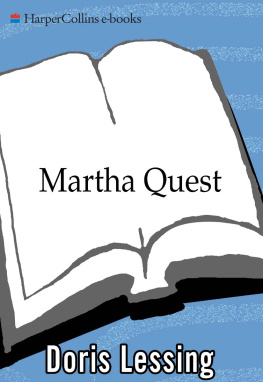The Presence of Absence
On Prayers and an Epiphany
Doris Grumbach

I AM GRATEFUL TO
Walter Dickhaut
Daniel Harvey
Edward Kessler
Ellen LaConte
Paul Munson
Allan Sandlin
Margaret Whalen
Barbara Wheeler
and Esther Williston
all of whom, in one way
or another, contributed
books, ideas, quotations,
challenges, disagreements,
and useful, relevant material
to this book.
The truth is that every sheet of blank paper by its very emptiness affirms that nothing is as beautiful as what does not exist. In the magic mirror of its white expanse the soul beholds the setting where signs and lines will bring forth miracles. This presence of absence both spurs on and, at the same time, paralyzes the pens commitment. There is in all beauty an absolute that forbids our touching itit sends forth something sacred that gives pause and strikes the man about to act with doubt and awe.
Paul Valry, La Feuille Blanche
written for La Feuille
CONTENTS
SINGLE FILE
As A YOUNG CAMPER in the Catskill Mountains, raised on the strict cement of New York City streets, I remember the summer pleasure of walking through the woods on a very narrow path, so small that I had to put one foot in front of the other to go forward. Single file, we were told to walk. It meant walking one by one; but I thought it described one foot at a time, an emphasis on the smallest possible approach to progress.
Sixty-seven years later, I see that I am now trying to walk an inner life in idiosyncratic single file. It may well be that via trita est tutissimathe beaten path is the safestbut I have meandered from it and taken the via singulatim, a road of my own, in my attempt to reach what I have been searching for all these years.
I offer this rather elaborate image to clarify what it is I shall not, cannot, do in these pages. I cannot prescribe this journey, this route, this search, for anyone else. I believe that such treks into the interior must be made alone. The single track must be limited to one traveler. Its map will not be useful to any other person.
What is difficult about the trip is its extent. Dag Hammarskjld reported in his surprising, posthumously published Markings, describing his secret spiritual life, that the longest journey is the journey inward.
For some years I have looked at guidebooks, how-to books, personal accounts, advice-to-the-prayer-life works, all offering helpful hints on attempting the same expedition. They are well intentioned, I am sure. But they violate the one rule of which I am certain: no one can act as guide for anyone else. No one way is better, or best. All travelers must pack their own baggage, start out alone, travel single file, endure all the disappointments, despairs, and darknesses by themselves, and be resigned to making very slow progress. Still, as Montaigne said, It is not the arrival but the journey that matters.
With this disclaimer, I shall try to describe my long and continuing search to recover a sense of the presence of God. The Quaker writer Thomas Kelly (of whom you will hear a great deal more later) thought that the most fundamental thing his writing could do was bring people into the presence of God and leave them there. Of course, I cannot hope to accomplish his first action, when I have not yet found the way there for myself. So I will settle for writing an account of a journey that continues, and to leave the reader there, to embark upon his own stormy sea.
AS IT WAS IN THE BEGINNING
And in our sleep
pain, which can not forget
falls drop by drop
upon the heart
until in our own despair
against our will comes wisdom
by the awful grace of God.
Aeschylus
THE MIDDLE OF THE ROAD
God clepe folk to hym in sondry ways
Geoffrey Chaucer, The Canterbury Tales
[Prologue, The Wife of Baths Tale]
CODA
This people prays to me with their lips
but their heart is far from me.
Isaiah, 29:13
THE EXPERIENCE OF PRESENCE
Many years ago an extraordinary thing happened to me. I have never been able to forget it. I have tried to believe it did not happen. But the memory of it, nagging, persistent, unavoidable, has never left me. For more than fifty years I waited for it to happen in the same intensity again. That it did not I attributed to the overcrowded condition of my life, and to my unworthiness.
It was a simple thing: two years after the end of World War Two, I sat on the shallow steps of a small house we owned in a village, Millwood, in Putnam County, a little north of New York City. My husband had taken our two, very young children in our wondrous new Ford to the market in Chappaqua, a nearby town. I was alone, for me a rare condition. I do not remember thinking about anything in particular in that hour except perhaps how pleasant, in my noisy life, how agreeable, the silence was.
What happened was this: sitting there, almost squatting on those wooden steps, listening to the quiet, I was filled with a unique feeling of peace, an impression so intense that it seemed to expand into ineffable joy, a huge delight. (Even then I realized the hyperbole of these words but I could not escape them.) It went on, second after second, so pervasive that it seemed to fill my entire body. I relaxed into it, luxuriated in it. Then with no warning, and surely without preparation or expectation, I knew what it was: for the seconds it lasted I felt, with a certainty I cannot account for, a sense of the presence of God.
You cannot know how extraordinary this was unless you understand that I was a young woman without a history of belief, without a formal religion or any faith at all. My philosophical bent was Marxist; I subscribed to the opium-of-the-people theory. I had never read the account of Julian of Norwichs shewings; I had never heard of Simone Weil and her experience in Assisi. For me to have been visited by what Monica Furlong in Travelling In has described, in even greater hyperbole, as a spiritual radiance, a marvelous bliss, a noble freedom, an ecstatic sweetness an overflowing abundance of immense delight was incomprehensible. But more astonishing to me, at that moment, was that I identified, without a moments doubt, Whose presence it was I was experiencing. I cannot account for this certainty; I only know I was sure.
Then, after those long seconds, I felt an ebbing, a leaking out from me, a sense of increasing loss of the mysterious Substance around me, above me. The resultant feeling of emptiness was enormous, and strange to me. All my life (twenty-seven years) I had been filled with ideas, memories, fears, thoughts about everything I had experienced: memorized sentences from books, scraps of music I loved, visions of pictures I cherished. The space that was my mind was never without bits and pieces of content. This emptiness was inexplicable to me.
Until those inexpressible moments I had taken no notice of God. I had given His existence no attention, except to harbor a thoughtless conviction that God could not, reasonably, exist. When the sense of His presence had passed, my reason returned in the form of questions I asked myself until my family returned. But I went on for a long time mulling over the questions: How did I know who It was? Why did I so unhesitatingly give It the name of God? What did I need to do to get Him back?

